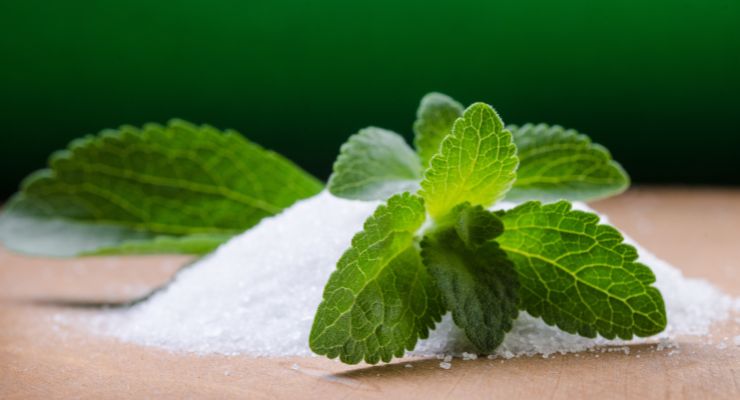By Mike Montemarano, Associate Editor06.06.23
Icon Foods has launched SteviaSweet RM95, a 95% Rebaudioside M (Reb M) stevia extract. The extract is formulated to have a clean flavor profile absent of the bitter notes often associated with other forms of stevia, according to the company.
The high-intensity, zero-calorie sweetener provides a neutral sweet taste without the use of flavor maskers, the company noted. It also works well with other high-intensity sweeteners to increase sweetness or modulate flavor.
“With its balanced flavor, SteviaSweet RM95 allows formulators to naturally sweeten with stevia and achieve a clean taste,” said Thom King, CEO of Icon Foods. The result is a flavor remarkably similar to sugar without the need for expensive taste modifiers or maskers, which can also extend development times. This next-generation stevia sweetener will support faster innovation and quicker revenue generation for our customers.”
“Blind qualitative descriptive analysis taste testing found that SteviaSweet RM95 delivers a natural sweet flavor very comparable to sugar in water,” King said. “Formulations with Reb A often face limitations due to the strong licorice and bitter taste. With its proprietary sourcing and chemical-free extraction method, SteviaSweet RM95 can achieve high levels of natural sweetness without the unwanted off-notes.”
SteviaSweet RM95 is manufactured in the U.S. from stevia leaves grown in Peru. According to Icon Foods, it is perceived as 20-40% sweeter than Reb A stevia, offsetting costs since less is needed to achieve the same level of sweetness.
King noted that higher purity levels of steviol glycosides result in fewer off notes. “While we also offer even higher levels (98% RebM), there is little difference at that level. However, a significantly lower level, such as 80%, can result in more off notes,” King said. “The more important issue is standardization. Having standard grades of glycosides makes for a more stable supply chain. It also provides for a more competitive pricing environment when there are not a bunch of proprietary purity levels or grades.”
It is suitable for a variety of applications, including carbonated and non-carbonated beverages, dairy and non-dairy products like yogurt, milk, and ice cream, fruit products, baked goods, condiments, nutraceuticals, and more.
Icon Foods also offers customers using its SteviaSweet RM95 the chance to utilize the company’s formulation and reformulation services at no charge, which includes a team of food scientists whose primary expertise is clean label sugar reduction and steviol glycoside blends, King noted.
“There are 13 different known glycosides in the stevia leaf,” King said. “Through selective breeding techniques coupled with bioconversion and various forms of enzyme catalyzation, it has become both scalable and efficient to manufacture a variety of different glycosides such as rebaudioside D, C, and the most interesting rebaudioside M, known as Reb M.
“As more glycosides become more available at scale and affordability, blending glycosides for maximum results will lead the clean-label, sugar-reduction revolution,” King continued. “The more purified and bio-converted steviol glycosides are leading in popularity among formulators.”
While all steviol glycosides are stable in a variety of manufacturing differences, there are a few key differentiators between Reb M and Reb A, affecting their applications, King said.
“While Reb M is technically less sweet than its close cousin, Reb A, the allosteric modulation characteristics of Reb M result in it being perceived as being sweeter,” King said. “Reb M affects the palate in an almost mystical way, hitting the back of the palate while Reb A hits mostly the front of the palate. Reb M really shines as a sweetness or flavor modulator due to the positive allosteric modulators. Blending Reb M with Reb A, and even thaumatin, can be a potent combination that delivers a very neutral sweetness with virtually no off notes when used at .35-.75% of the total solution.”
The high-intensity, zero-calorie sweetener provides a neutral sweet taste without the use of flavor maskers, the company noted. It also works well with other high-intensity sweeteners to increase sweetness or modulate flavor.
“With its balanced flavor, SteviaSweet RM95 allows formulators to naturally sweeten with stevia and achieve a clean taste,” said Thom King, CEO of Icon Foods. The result is a flavor remarkably similar to sugar without the need for expensive taste modifiers or maskers, which can also extend development times. This next-generation stevia sweetener will support faster innovation and quicker revenue generation for our customers.”
“Blind qualitative descriptive analysis taste testing found that SteviaSweet RM95 delivers a natural sweet flavor very comparable to sugar in water,” King said. “Formulations with Reb A often face limitations due to the strong licorice and bitter taste. With its proprietary sourcing and chemical-free extraction method, SteviaSweet RM95 can achieve high levels of natural sweetness without the unwanted off-notes.”
SteviaSweet RM95 is manufactured in the U.S. from stevia leaves grown in Peru. According to Icon Foods, it is perceived as 20-40% sweeter than Reb A stevia, offsetting costs since less is needed to achieve the same level of sweetness.
King noted that higher purity levels of steviol glycosides result in fewer off notes. “While we also offer even higher levels (98% RebM), there is little difference at that level. However, a significantly lower level, such as 80%, can result in more off notes,” King said. “The more important issue is standardization. Having standard grades of glycosides makes for a more stable supply chain. It also provides for a more competitive pricing environment when there are not a bunch of proprietary purity levels or grades.”
It is suitable for a variety of applications, including carbonated and non-carbonated beverages, dairy and non-dairy products like yogurt, milk, and ice cream, fruit products, baked goods, condiments, nutraceuticals, and more.
Icon Foods also offers customers using its SteviaSweet RM95 the chance to utilize the company’s formulation and reformulation services at no charge, which includes a team of food scientists whose primary expertise is clean label sugar reduction and steviol glycoside blends, King noted.
Innovating with Glycosides
Reb M is one of many glycosides that gives stevia its sweet flavor, but is associated with a less bitter aftertaste, less sourness, less licorice and leafy notes, and lower astringency compared to Reb A, which is the most commonly used steviol glycoside, according to Icon Foods.“There are 13 different known glycosides in the stevia leaf,” King said. “Through selective breeding techniques coupled with bioconversion and various forms of enzyme catalyzation, it has become both scalable and efficient to manufacture a variety of different glycosides such as rebaudioside D, C, and the most interesting rebaudioside M, known as Reb M.
“As more glycosides become more available at scale and affordability, blending glycosides for maximum results will lead the clean-label, sugar-reduction revolution,” King continued. “The more purified and bio-converted steviol glycosides are leading in popularity among formulators.”
While all steviol glycosides are stable in a variety of manufacturing differences, there are a few key differentiators between Reb M and Reb A, affecting their applications, King said.
“While Reb M is technically less sweet than its close cousin, Reb A, the allosteric modulation characteristics of Reb M result in it being perceived as being sweeter,” King said. “Reb M affects the palate in an almost mystical way, hitting the back of the palate while Reb A hits mostly the front of the palate. Reb M really shines as a sweetness or flavor modulator due to the positive allosteric modulators. Blending Reb M with Reb A, and even thaumatin, can be a potent combination that delivers a very neutral sweetness with virtually no off notes when used at .35-.75% of the total solution.”



























